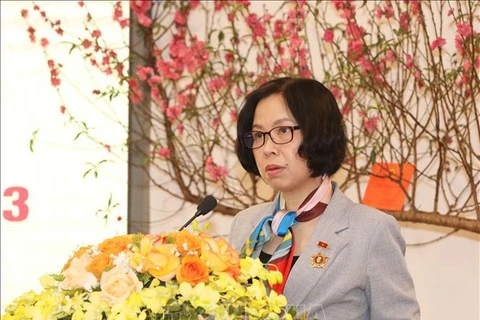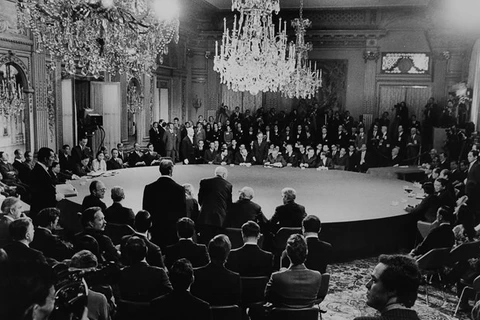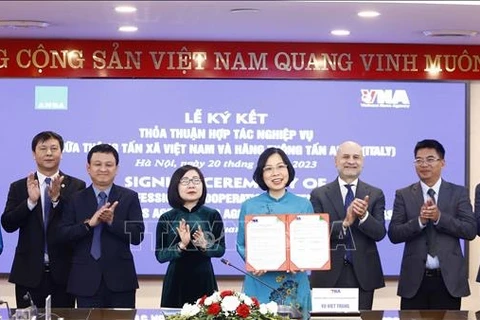 The VNA has maintained a continuous and strong flow of information, accurately reporting all developments in the economic, political and social life as well as major issues and events of the country and the world. (Photo: VNA)
The VNA has maintained a continuous and strong flow of information, accurately reporting all developments in the economic, political and social life as well as major issues and events of the country and the world. (Photo: VNA)Hanoi (VNA) – On February 6, a piece of breaking news was posted on Vietnam News Agency (VNA) news website vnanet.vn, providing key information on the earthquake in the central region of Turkey. Only a few minutes later, the news was simultaneously reported and continuously updated on many VNA publications including vietnamplus.vn in six languages, as well as baotintuc.vn; vietnamnews.vn; and lecourrier.vn. Perhaps at that time, not many Vietnamese people paid attention to the news. But they were then shocked by the surge in number of deaths reported by the VNA just a few hours later.
Always be one of the earliest at hot spots
During that morning, the news of the devastating earthquake made highlights of all media publications of the news agency. VNA General Director Vu Viet Trang and other leaders of the agency continuously kept a close eye on the developments of the disaster and directed VNA representative offices in nearby areas to promptly reach the site.
Two VNA correspondents in Rome were among the earliest reporters from Vietnam to be present at the site to cover the news. Not only working as reporters, they joined the Vietnamese search and rescue forces in rescuing activities.
Photos, videos and news were continuously sent back from the scene an immediately processed to be published in all VNA publications.
 Two VNA correspondents in Rome were among the earliest reporters from Vietnam to be present at the earthquake site to cover the news. (Photo: VNA)
Two VNA correspondents in Rome were among the earliest reporters from Vietnam to be present at the earthquake site to cover the news. (Photo: VNA) Meanwhile, VNA media outlets at home also hurriedly collected and posted information from many sources in developments of rescue work as well as information about Vietnamese people living in Turkey.
A smooth news production chain was set up and worked at high capacity as an information line on the earthquake disaster in Turkey and Syria. At that time, the VNA took the lead in providing diverse, fast and accurate information on the event, showing the world the brave and effective efforts of Vietnam as well as the international humanitarian spirit of the nation and people of Vietnam through the State agency’s multi-language publications.
One may be surprised about the fast and smooth operations of the whole the VNA system from leaders to reporters, editors and even supporting units from many departments and sections of the agency. But for insiders, this is a familiar process, as they are well prepared for large-scale news lines requiring fast and exact coordination for a common purpose of providing accurate news to the public.
This is a familiar task that the VNA began right from its establishment. In Autumn of 1945, on September 15, the Vietnam News Agency, which was called “Viet Nam Thong Tan Xa” named by President Ho Chi Minh, published the full text of the Declaration of Independence along with a list of the members of the Provisional Revolutionary Government through bulletins in three languages – Vietnamese, coded VNTTX, English, coded VNA and French, coded AVI. This was an event of great significance not only to the VNA but to the whole nation.
Since then, each VNA "battle" was designed with a smooth process in which journalists-soldiers type pieces of news and send it to the headquarters, the editors processed, published and distributed them to domestic press agencies, and at the same time translated them to many foreign languages and spread them to the world.
Over 77 years, the process has been increasingly perfected to ensure the accuracy, timeliness and reliability.
A series of “hot news” items in Vietnam and the world in all topics from politics-society, COVID-19 pandemic, Vietnam’s national sovereignty over seas and islands, anti-corruption, and Russia’s military campaign in Ukraine, to regional and world sports events, have been provided to the public in a comprehensive, full, and multidimensional manner. Such news helps the public understand clearly and properly all aspects of social life inside the country and all over the world.
Furthermore, the VNA's strategic, objective, multi-dimensional, and strategic information reports have always been a reliable and necessary preference source for the Party and State, receiving high evaluation thanks to high efficiency.
Commenting on the role of the VNA, a leader of a large-scale firm of Vietnam underlined that the VNA is a mainstream media agency, the information channel of the Government and the supplier of the domestic and international journalism system. Thus it is the most reliable news agency that businesses can trust. “We’ve found that VNA information always accurate, timely and helpful,” said the entrepreneur.
Pioneering in fake news fight
With diverse and multi-dimensional news products made with the joint efforts of the whole system, the VNA has made effective contributions to guiding public opinion, reinforcing people’s trust in the Party and State, fighting negative phenomena and wrongful arguments by hostile forces inside and outside the country, protecting the country’s sovereignty, and maintaining socio-political stability of the nation.
In the current context where information is spread instantaneously, the number of fake and unverified news has increased. This is an ideal situation for hostile forces to conduct their sabotage activities.
If the Party and State’s policies are not fully provided to the public, they can be distorted. Therefore, the task of mainstream media agencies like the VNA is clarifying and analysing information in a multi-dimensional manner to ensure the policies reach the public, thus easing social pressures on policies.
 VNA General Director Vu Viet Trang speaks at a national conference on press operations. (Photo: VNA)
VNA General Director Vu Viet Trang speaks at a national conference on press operations. (Photo: VNA) In the recent three years when the world faced the COVID-19 pandemic, many rumours spread on the Internet, affecting the anti-pandemic efforts by the country. When Ho Chi Minh City was focusing on fighting the pandemic and Vietnam implementing the vaccination campaign, fake news surfaced. This worried people across the country, mostly on the number of fatality due to the pandemic and negative effects of COVID-19 vaccines.
At that time, the VNA proved its role as a reliable source of news. Through its 93 representative offices inside and outside the country, the agency reported the pandemic developments in all localities and many places around the world in a fast and accurate manner. It also reassured public opinion by optimising its social network accounts to reply to and refute wrongful information about the pandemic, thus building social consensus, encouraging people in implementing pandemic prevention and control measures. The COVID-19 information campaign was conducted in a systematic and professional manner with the close cooperation of all VNA units.
Thanks to people’s clear understanding of the Party and State’s policy, the country managed to return to the new-normal situation and a period of post-pandemic economic recovery and development.
Along with acting as a giant and effective news bank for audience and other media agencies, during that period, the VNA also developed a project called “The Fight Against Fake news – Creative Ideas and Effective Solutions”, aiming to help readers cope with fake news. For the first time, a Vietnamese media agency had introduced a particular channel for information verification, detecting a variety of fake news.
“Mainstream media has always been the place where readers can verify the accuracy of any information. Therefore, the press must firmly maintain its operating principles to become a key player in cyberspace,” stated VNA General Director Vu Viet Trang.
As a State agency, despite the coming into being of many information sources, especially on the cyberspace, the VNA secured its role as an official, mainstream, reliable, timely and diverse news supplier for other media agencies and people inside and outside the country.
VNA information has been highly valued by the Party, State, ministries, sectors, localities, other media agencies, and the people.
The Government’s Decree No.87/2022/ND-CP clarifies that the VNA is a key multi-media news agency performing the function of posting and broadcasting official information and documents of the Party and the State; announcing official views of the State on current affairs; redirecting information that is not in line with national interests; rejecting and correcting wrongful information; issuing statements refuting the information intended to be misleading when necessary.
Leading major news campaigns
With its leading role and guiding position in major information campaigns, the VNA has been proposing and implementing information projects to protect the Party’s ideological foundation, national sovereignty over seas and islands, and reject wrongful arguments from hostile forces.
Special columns have been set up in all major information units of VNA, including that on national seas and island which comprises a large number of news, photos and videos. Particularly, it highlights Vietnam’s stance on settling the East Sea issues by peaceful measures as well as the country’s efforts in promoting the role of the ASEAN and the world in the field in line with the spirit of the UN Convention on the Law of the Sea (UNCLOS) 1982 and the Declaration on the Conduct of Parties in the East Sea (DOC) 2002.
The “Party building” column of the VNA and its publications has been built with the purpose of protecting the Party’s ideological foundation. It gives space to the article titled “Some theoretical and practical issues on socialism and the path towards socialism in Vietnam” written by Party General Secretary Nguyen Phu Trong. It also provides a platform for information on Party building and rectification activities in all aspects, along with the information on anti-corruption activities. The column has received positive feedback from readers.
Meanwhile, the “Human rights” has also been one of the key and first columns set up by the VNA on its portal and online publications as well as daily, weekly and monthly printed publications.
As a result, VNA reporters have received many national-scale noble awards on for their excellent works.
On right track towards digital transformation
With the developments of science and technology and artificial intelligence (AI), the world journalism has entered a new era with a complete change in people’s approach to information. The VNA clearly understands the significance of digital transformation in enhancing its operational efficiency and securing sustainable development.
A new journey in seeking and applying digital technologies and operation models has started to better perform its tasks. Various measures have been rolled out, including the maximum application of technologies in reporters’ operations, and the strengthening of cooperation among reporters at the scene and editors at home.
Trends in content personalisation, cross-platform, mobile journalism, social journalism, data journalism, creative journalism, global collaboration, journalism mega-hits, audio data files, AI, fake news and information verification activities have been deployed by the VNA in each unit as well as at its headquarters.
With its network of 30 representative offices abroad and 63 others across the country closely connected to the headquarters, the VNA has maintained a continuous and strong flow of information, accurately reporting all developments in the economic, political and social life as well as major issues and events of the country and the world.
The VNA has also directly engaged in new communications channels. Currently, the agency is operating 14 fanpages on Facebook, including those in foreign languages, turning them into a channel to report the country’s achievements during the national construction and development.
This is also a tool for the agency to reject wrongful and harmful information, thus redirecting information through multi-media platforms and social networks.
The digital transformation cause in the VNA, according to VNA leaders, is to start early but not hurry, making firm steps with a long-term vision, turning digital technologies into tools helping the VNA secure and promote its role as a national news agency and a strategic information agency of the Party and State. It is also a key foreign relations news agency and a provider of accurate, reliable, timely, diverse news, and the supplier of reference reports with high contents of forecast information and strategic, objective and multi-dimensional news source for Party and State leaders. It is a key player in the struggle against hostile forces’ wrongful arguments on democracy, religion and human rights situation in Vietnam, protecting the national sovereignty and territorial integrity on the basis of international law./.
 The VNA has secured and promoted its role as a national news agency and a strategic information agency of the Party and State. (Photo: VNA)
The VNA has secured and promoted its role as a national news agency and a strategic information agency of the Party and State. (Photo: VNA) 





















